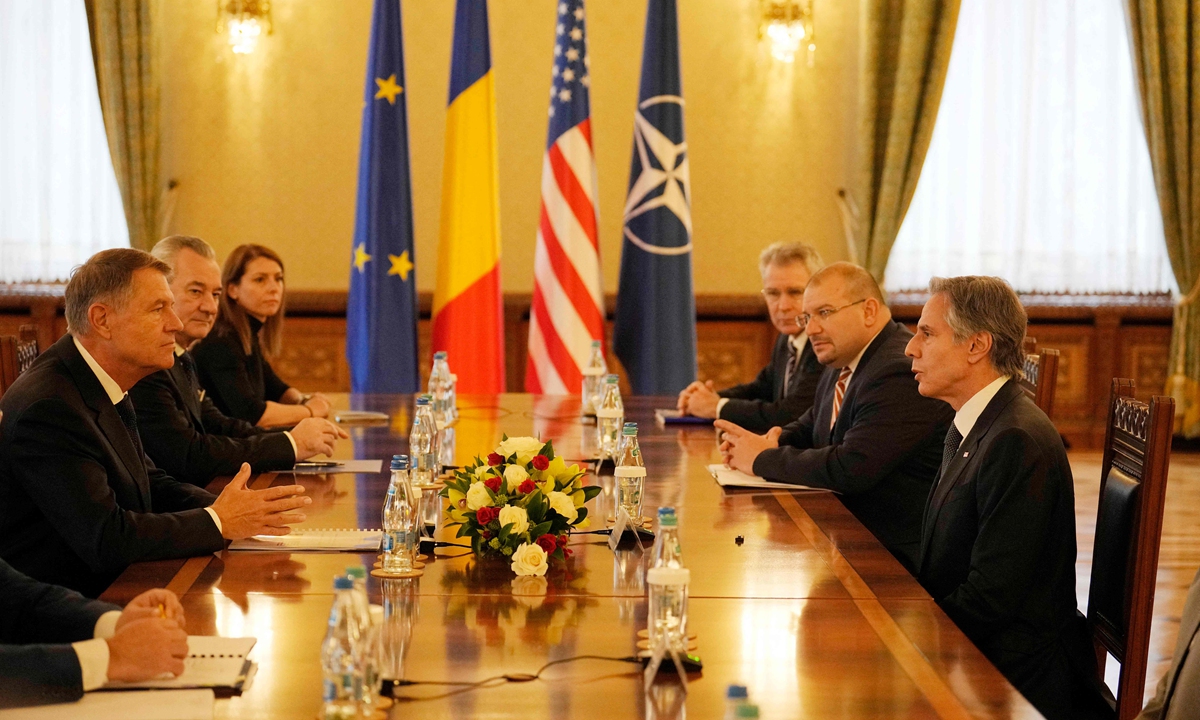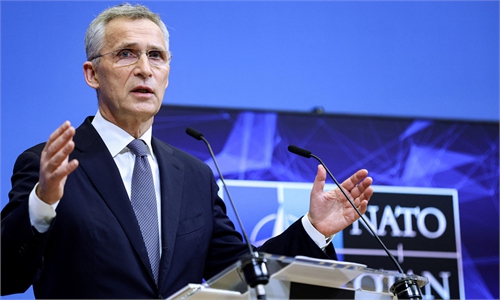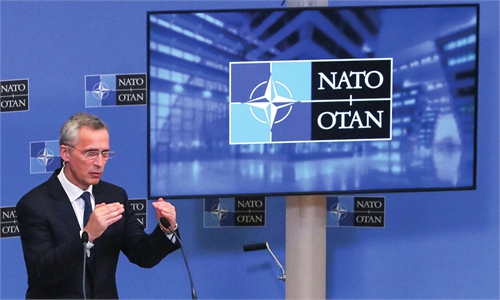NATO, 'in need to demonstrate unity' amid internal divergences, vows support for Ukraine

Romania's President Klaus Iohannis (left) meets with U.S. Secretary of State Antony Blinken (right) during a visit at the Romanian Athenaeum in Bucharest, on November 29, 2022. Blinken attends the meeting of NATO Ministers of Foreign Affairs in the Romanian capital. Photo: VCG
NATO foreign ministers pledged to continue to support Kiev at a meeting in Romania, despite many member states having already exhausted their military reserves and undergoing energy and price crises, as such a generalized political consensus is easiest to achieve when bloc members disagree over concrete actions, Chinese observers said on Wednesday.
NATO Secretary General Jens Stoltenberg outlined the key decisions taken by NATO foreign ministers at their meeting in Bucharest on Tuesday, underlining that the meeting sends "a strong message of NATO unity, and of sustained support to Ukraine."
Stoltenberg said that NATO recognizes and respects Ukraine's aspirations for membership. However, the focus now is on providing immediate support as Ukraine defends itself against Russia.
Stoltenberg, as well as US State Secretary Antony Blinken, said the meeting was also aimed at addressing the "challenges that China poses to NATO." Blinken, in a short speech ahead of the meeting, underscored the concept of "unity" and "alliance," according to a release of the White House.
Zhang Hong, an associate research fellow with the Institute of Russian, Eastern European and Central Asian Studies at the Chinese Academy of Social Sciences (CASS), believes there is a new peak of antagonism amid airstrikes on key infrastructure in Ukrainian cities, knocking out power and water services.
Liu Zuokui, a research fellow on European studies at CASS, told the Global Times on Wednesday that the US and Europe want to enhance NATO's scale and level of solidarity through the crisis and political consensus of supporting Ukraine against Russia is the easiest to make.
But the members have divergences over concrete agendas, such as Turkey's opposition to Finland and Sweden's membership, not to mention that many have exhausted their military equipment reserves, Liu said.
In an interview with the German newspaper Welt am Sonntag, Stoltenberg admitted that Western countries' military and financial support to Kiev is costing their societies dearly. "Rising food and energy bills mean hard times for many households in Europe."
Similarly, an article in The New York Times on Saturday, titled "US and NATO Scramble to Arm Ukraine and Refill Their Own Arsenals," cited a NATO official who said that in terms of providing weaponry to Ukraine, smaller countries have exhausted their potential, with 20 of its 30 members "pretty tapped out."
The chairman of NATO's military committee, Rob Bauer, said strains on stockpiles are "across the board" but that Russia is having the same problem.
Against the backdrop of NATO members being split on whether it is time to advance peace talks, French President Emmanuel Macron is set to meet US President Joe Biden on Wednesday to discuss not only Ukraine but also the risk of a transatlantic trade war, France24 reported Wednesday.
"We are not allies on the same page," one adviser to Macron told AFP, forecasting "challenging" talks with Biden.
NATO emphasized "unity" at the foreign ministers' meeting when they are trying to tamp down widening internal divergences, analysts said, adding that a consensus on principles to yield substantial results and actions may be increasingly difficult, as thorny internal problems will force country leaders to weigh wins and losses with different perspectives.
Though there are reports about US officials nudging Ukraine into peace talks with Russia, their sincerity is questionable, because the US has made a great fortune by supplying energy to the EU, realizing its goal of containing Russia and strengthening the transatlantic partnership, Cui Heng, an assistant research fellow from the Center for Russian Studies of East China Normal University, told the Global Times.
The NATO agenda is very much a US-led one and bringing the "China challenge" to the NATO table is not surprising when the US keeps rallying transatlantic allies with values and ideology, experts said.
But Liu believes NATO hostility against China would not go beyond rhetoric for a while as it is busy with the Ukraine crisis and has great internal divergences on how to deal with China.
The US has formed many security mechanisms targeting China, Liu said, citing the Quad and the Five Eyes as examples. "NATO's role and capabilities to coordinate with the US in Asia remains to be seen."


